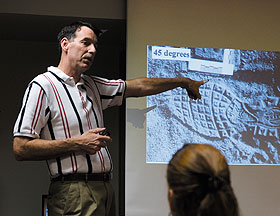  |
| HOME | THIS ISSUE | CALENDAR | GRANTS | BACK ISSUES | < BACK | NEXT > |
Citizens academy offers inside look at UConn police department by Richard Veilleux - November 17, 2008 | ||||
| Doreen Brown learned a few things about being a police officer this semester, including how hard it is to tell the difference between a bad guy and a good guy when patrolling darkened streets. Brown was one of 20 people who signed up this semester for the Citizens Police Academy, a program offered each fall by the UConn Police Department to faculty, staff, students, and members of the community. One of the activities involved a firearms training simulator. “It was like a video game, except that it was real tense,” says Brown, a Residential Life employee. “I was also surprised at how heavy a gun is. I really learned a lot.” The class met once a week for three hours over a 12-week period to learn about the department. Topics included hiring and training procedures, crime scene forensics, narcotics and alcohol violations, use of force issues, and active shooter situations. This semester’s program wraps up with a ‘graduation’ Nov. 19. Gaining a new perspective Participants enjoyed the course. “I was interested [in the program] because I was curious and wanted to feel more connected to campus,” says Stephanie Beron, who works in the dean’s office at the College of Liberal Arts and Sciences. “I was surprised at the things that go on, the war stories the instructors talked about, and the level of expertise they have. It was never boring, that’s for sure.” Brown got a new perspective on Halloween when she took up an offer to ride with an officer the night of Oct. 31. Joining a patrol officer for a night, from 10 p.m. until 3 a.m., is one of the experiences available to students in the class. “The officer explained to me why he went where he did and when,” says Brown, “how he would approach a group of people. I saw quite a range of activity.” Rich, who has been a UConn police officer for 18 years, got the idea for the academy during a training session at the FBI academy in Quantico, Va. He says UConn was the first university in the country to offer the program, although a number of municipal departments offer a similar program. Since it began, he says, other universities have called for advice on setting up their own program. “The goal is to interact on a normal basis with the general public. We tell them the first day that we want them to get to know us, and we want to get to know them, what matters to them, what they want us to focus on,” Rich says.
“We also want them to get to know what we do. People watch cop shows on TV, but they’re not sure what we do on a daily basis.” Most students who join the class are surprised when they discover what UConn police face from day to day, Rich says. “They’re surprised at the number and type of incidents we investigate.” People join the program for a variety of reasons. Some are interested in becoming police officers and want an overview of what they’ll face. Others just want to know what the police do. The program also has become popular with the police officers who teach it. “The officers enjoy it,” Rich says. “Every year more of them want to be involved.” Crisis response training They also walked the class through a video about how to respond when a shooter is in or near a building occupied by students, faculty, and staff. They pointed out that most shootings are over within minutes. “Police for the most part can respond to any incident on campus within three minutes,” says Rich. The video, based at Central Washington University, teaches people to get out or hide out in case of emergency. It also advises people to be aware of their surroundings, identifying possible exits and hiding places and objects that could be used as a weapon if necessary. “Whatever you can grab and throw at the shooter, do it. It distracts him and gives people a chance to run or grab him,” says Rich. “You have to be in a survival mindset.” Barry Schreier, director of mental health counseling in Student Health Services, says the course was really helpful. “Thank God we have people on campus who do this job.” |
| ADVANCE HOME UCONN HOME |

